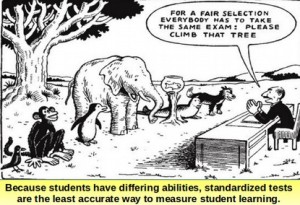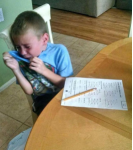Georgie Porgie, Puddin’ and Pie,
Took some tests that made him cry,
When the computers came on in May,
Georgie Porgie ran away.
Georgie Porgie is headed straight towards issues with mental health.
Welcome to Georgie Porgie’s “rigorous” world.
As the concept of “rigor” is explored, a picture of a ladder comes to mind. Think of a ladder with 12 rungs. Children enter classrooms standing upon different rungs. Picture for one moment, a child standing on rung one. All the rungs in between are missing leading up to the ultimate rung…
But.
Sigh.
Every child is pushed to rung 12 regardless.
- How does the child reach rung 12, when the stepping stones to 12 are gone?
- Do we look at the individual child and offer instruction at their individual level?
- Do we take into account what is developmentally appropriate for each and every child?
OR…
- Do we plow on… in the name of “rigor”?
- Do we teach them at such a level of frustration they lose their confidence as learners and give up?
What are we doing to our children in the name of rigor?
Rigor.
The new buzz word in education.
 We educators are encouraged to teach with more rigor… in order to help all of our students meet the new rigorous standards. In fact, one of the major shifts the Common Core Standards espouse is rigor. It is our job to push them to the top rung. Every single child must get to the top rung by the test date, regardless of their abilities, individuality, or where they started. Furthermore, all children are to accomplish the rigorous standards at the same exact time and prove it on a computerized test occurring on a handful of days in time. This test is the end all be all measurement as to whether the child has achieved the ultimate rung.
We educators are encouraged to teach with more rigor… in order to help all of our students meet the new rigorous standards. In fact, one of the major shifts the Common Core Standards espouse is rigor. It is our job to push them to the top rung. Every single child must get to the top rung by the test date, regardless of their abilities, individuality, or where they started. Furthermore, all children are to accomplish the rigorous standards at the same exact time and prove it on a computerized test occurring on a handful of days in time. This test is the end all be all measurement as to whether the child has achieved the ultimate rung.
Hmmm…
Rigor.
I went to my friend, Merriam Webster, and the word is defined as:
- rigor: the difficult and unpleasant conditions or experiences that are associated with something
- rigor: the quality or state of being very exact, careful, or strict
Enticing.
Does it draw you in?
Do you get “warm fuzzies all over” reading the definition?
No?
Merriam Webster has more…
Full Definition of RIGOR
- a (1) : harsh inflexibility in opinion, temper, or judgment : severity (2) : the quality of being unyielding or inflexible : strictness (3) : severity of life : austerity b : an act or instance of strictness, severity, or cruelty
- a tremor caused by a chill
- a condition that makes life difficult, challenging, or uncomfortable; especially :extremity of cold
- strict precision : exactness <logical rigor>
- a : obsolete : rigidity, stiffness c : rigor mortis
- b : rigidness or torpor of organs or tissue that prevents response to stimuli
Well?
Did this solidify the “warm fuzzies”?
Did the clouds break open and pour rays of sunshine into your world?
Or…
Did the black thunder clouds clap loudly and send a bolt of lightning straight to your heart?
Zing!
My guess is the definition solidified, like it did for me, the icy realization of what “rigor” is all about, and it zapped the Common Core Standards for what they really are… death.
Maybe this is why the rigid, inflexible ELA and Math programs have seeped into many schools, promoting exactness and precision, and the uncomfortable conditions within the walls of our classrooms.
Rigor… prevents the response to stimuli. EEKS!
Severity.
Cruelty.
EEKS!
Brrrrrrrrr….I just felt a tremor caused by a chill.
There are a lot of excellent teachers surrounding me. We believe in high standards for our students. We believe in developmental appropriate practice for each and every one of our students. Excellent teachers have an uncanny ability to look at each child individually, assess where they are, what they need, and how to challenge them at their unique learning pace.
Children standing on the lower rungs:
In a beginning of the year checkpoint, it was discovered that 80% of students in fifth grade were unable to do multi-digit multiplication or long division with whole numbers. According to the CCSS, students learn to fluently multiply multi-digit whole numbers using the standard algorithm in 5th grade (5.NBT.5), and fluently divide multi-digit numbers using the standard algorithm in 6th grade (6.NS.2).
The first module from the district pacing guide entails place value of decimals, and addition, subtraction, multiplication, and division of decimals. (Rung 10). These students, missing rungs four through nine, were being taught skills and concepts they had no access to because the foundational skills necessary weren’t there. Yet, when I mentioned this, I was told the students had equal rights to the mathematical content as the rest of the students, “The standards are more “rigorous”, and the only way for them to learn the more “rigorous” standards is to teach with more “rigor”. Teach the module in the order given, and find another time in the school day to ‘catch the students up’.”
Can anyone take a flying guess as to how these students did on the End of Module 1 Assessment?
To view the Module 1 Assessment, Scoring Guide, and an Example of Level 4 Answers, click (here).
Most scored level 1s and 2s. Went home with failing grades.
This is Rigor folks!
 Raise the rung so high the students can walk right under it.
Raise the rung so high the students can walk right under it.
Chilling.
Next? Move on to the next module of instruction… fractions!
“Just keep swimming. Just keep swimming. Just keep swimming, swimming, swimming. What do we do? We swim, swim.” – Dory from Nemo.
Just keep rigoring, rigoring, rigoring. What do we do? We Rigor, Rigor.
Children standing on the higher rungs:
What of those students who are exceling? Students in 6th grade placed in advanced math classes? Here’s a story you may find disturbing:
“My child told me that out of his class, only two students passed the SBA Interim Practice Test, both Math and English. He said that the teachers were quite upset, and compared test results from other schools within their district, to try and show them where/how they went wrong. He was fascinated, because prior to the test, the class was of course instructed that it was not to be spoken of or about in any manner, with anyone, including parents, so he knew this was a big “no no”. He was breaking the rules speaking to me.”
On February 18th, this mom received the following letter from the school:
“Dear Families,
Tomorrow we will be mixing up the orange and green classes for the remainder of the year. We have put a lot of thought into this process. Here are our reasons. First, the majority of our orange advanced math students are having a very difficult time keeping up with the accelerated pace and content of the advanced math curriculum. The frustration factor of students has reached an all-time high and motivation an all-time low. (Emphasis mine)
Only a handful of students meet the criteria to continue in advanced math. The rest were placed probationary. The students who qualify for advanced math will continue with the program in a small group and everyone else will begin Chapter 5 of our regular 6th grade curriculum.”
Flabbergasted isn’t near the word to capture my thoughts.
The majority of the 11 and 12 years olds placed “probationary”. This is college and career ready?
How “rigorous”.
The mom went on to express:
“So now, only a few of the advanced students will continue to be taught the advanced math, the rest will now be demoted to the regular class, these are my words, not theirs. Isn’t it wonderful to know that the advanced students really aren’t talented, and they were able to be taken down a peg or two, as certainly it couldn’t be the curriculum? They WILL be forced to conform and stop thinking, no matter the cost.”
My brain buzzes around questions like:
- Are the students really not smart enough?
- Are they really not motivated?
- Are they really incapable?
And…
- Could it possibly be the program?
- Could it possibly be the instruction the program encourages is not engaging or aligned with research?
- Are there manipulatives?
- Are the lessons differentiated?
- Do they get to explore ideas or regurgitate answers from the followed script?
- How many pencil and paper problems are the students given a day?
Rigor Rigor Snore Bore… Death.
The death of the hearts and minds of our children. The death of the love of learning.
This kind of rigor is about death… not life.
A fourth grade teacher on the west side of Washington State attached the picture below, and wrote, “This is what happens when we put our children into pressure cookers. Shared by my friend, Florida parent/activist Sandy Stenoff. Florida, where student test scores make up 50% of a teacher’s evaluation (even if you don’t teach those students), and 3rd graders don’t go to fourth grade if they don’t pass the state test. These “reforms” sound great to corporate thinkers who know nothing about what motivates children or teachers. Or perhaps they do know, and this is their intent. Please help us turn this machine off! We must return to a place where authentic teaching and learning are possible, are encouraged, are funded.”
Sandy writes, “My son is a college sophomore and shared these words from a HS senior, so I made this poster. He said, ‘Look at this. This is how most kids really feel now’. To me, THIS is the highest stake… an entire generation of children who leave school feeling like this.”
“I’m so…”
What are we doing to our children in the name of “rigor”?
“I just want to get a repetitive mindless job I don’t feel extremely anxious about”
Disheartening.
Worrisome.
Tragic.
How many years have we had in NCLB? Fourteen years? Isn’t this enough time to paint a pretty clear picture this standardized, one size fits all, high stakes testing madness…
Does. Not. Work.
So… what does the National Department of Education do with billions from philanthropists?
Create yet another set of standards. More “rigorous” standards. The individual state’s set of standards supposedly failed, so these National “Common” Standards are supposedly filled with magic bullets of “rigor”. The tests so “rigorous”, children at eight years old, with hand spans missing the length of a key board, are asked to type essays incorporating a comparison analysis of two separate texts, type explanations about how they solve “rigorous” math problems using deep levels of reasoning, and…
Their eyes fill with tears.
Rigor in The Classroom… A Short two minute Video
Watch (Here)
Absolute crazy making.
This video is metaphorical and exemplifies the vicious cycle of “rigor”. The continued mandates, in the name of “rigorous standards”, have impacted the teacher, the principal, and clearly the most precious of all…. Our children.
This kind of “rigor” belongs to Mortis.
Rigor Mortis.
This rigor is stiff and lifeless.
It will be the death of our public school system unless we change course.
Georgie Porgie Run Away.
Far, Far Away.
Our children deserve high standards at their developmental learning level, whether they come to us at rung one or twelve. They deserve to be challenged and encouraged to grow at their own individual, developmental pace. 
Passionately Submitted,
RAZ ON FIRE
References:
 1. This licensed clinical social worker and psychotherapist describes, in alarming detail, the harmful effects the common core state standards and the high stakes tests are having upon children, as well as teachers. View the 13 minute video (here).
1. This licensed clinical social worker and psychotherapist describes, in alarming detail, the harmful effects the common core state standards and the high stakes tests are having upon children, as well as teachers. View the 13 minute video (here).
 2. The following article was written to capture real stories from real families about the impact of common core and the common core aligned programs focused upon rigor. Click (here) for the full story.
2. The following article was written to capture real stories from real families about the impact of common core and the common core aligned programs focused upon rigor. Click (here) for the full story.
 3. This photo was submitted by a parent. Her child is suffering with the age inappropriate, error and trick laden, too much, too soon, too fast, common core homework. This photo was shared on social media. Without asking for any response, it still received hundreds of commiserating comments within a half hour. The responses can be read (here).
3. This photo was submitted by a parent. Her child is suffering with the age inappropriate, error and trick laden, too much, too soon, too fast, common core homework. This photo was shared on social media. Without asking for any response, it still received hundreds of commiserating comments within a half hour. The responses can be read (here).



Reblogged this on stopcommoncorenys and commented:
This is a must read.
LikeLiked by 1 person
Reblogged this on gottadobetterthanthis and commented:
–
I’ve read through at this point, and anyone who cannot see this teacher’s frustration simply cannot see.
I was inspired early in the reading, and I stopped and wrote this:
Assume for the moment that I am a trainer for a company.
My employer employs me to train new-hires and bring them up to speed per the company’s needs. If I am good at these duties, I help the best and brightest move through the program quickly, minimizing resources expended on them while they become useful to the company, helping in profitability, and ensuring longevity in their position and the company’s ability to continue to pay them and increase their salary in accordance with their value to the company.
Likewise, for the average personnel, it will be my duty to help each obtain competency in a reasonable time-frame with a reasonable amount of resources expended. These employees can then move on into full partnership in the work of the company as value generators, increasing profitability such that they have longevity and continuing reasonable increases in their salaries, consistent with their abilities and value to the company.
The company has certain goals. The company has narrow focus. The company cannot afford incompetency or lethargy. As the trainer, it is my duty to keep focus and ensure each new-hire learns these facts of the company, and each learns the skills the company needs. Each new-hire must come to understand that the company’s needs are limited. Many skills are simply inappropriate for achieving the company goals and ensuring continued profitability.
Accordingly, my duties as trainer include weeding out those who simply will not get it, even if they have exceptional talents in some areas, areas the company does not need. Those who are not going to contribute to achieving company goals and continued profitability must go, pink slips.
Harsh.
Rigorous. Yes, absolutely.
As the company trainer, I need to be adaptable and flexible in teaching so as to maximize efficiency and minimize costs associated with training, which by its nature is unproductive and unprofitable. (Fortunately companies recognize the need for training and preliminary value, thus increasing profitability over the longer term.)
Rigor in this instance is good and essential, even though it is harsh. With our new-people, our children, we really do not want rigor. We want the tailoring, the flexibility, and adaptability of our teachers, our systems, and our instructional material, and requiring rigor there seems useful, as long as we maintain relationships and don’t loose sight of the fact that we are all people, regular people, not supermen.
But rigor is not what we need of our students.
We need to partner with them. We need to equip them with tools and the skills to use those tools to become whatever they want to become. We are humanity, not the company. We have no overall goals, other than to maximize the potential of everyone of us. Let’s let freedom figure out the rest. We don’t need college and career ready. We need people who understand what love and relationship means, people who know it first hand, and people who, by the way, know how to read and cipher and think outside their own emotion-filled box—people who grasp reality and are able to deal with it. We do not need standardized tests to ensure this is what we get.
LikeLiked by 1 person
Reblogged this on and commented:
This touches on so many points that I feel about Common Core.
LikeLiked by 1 person